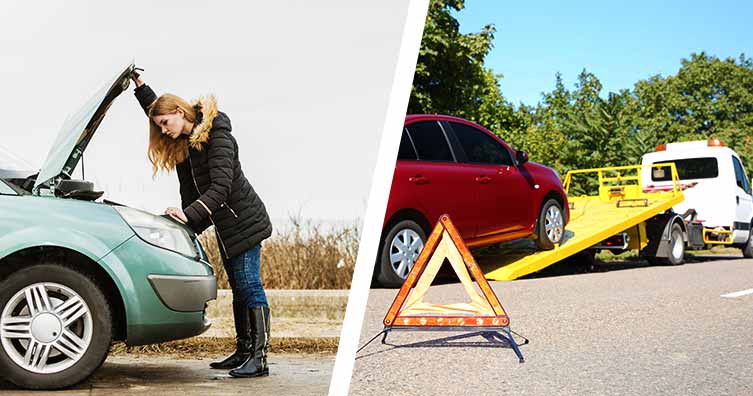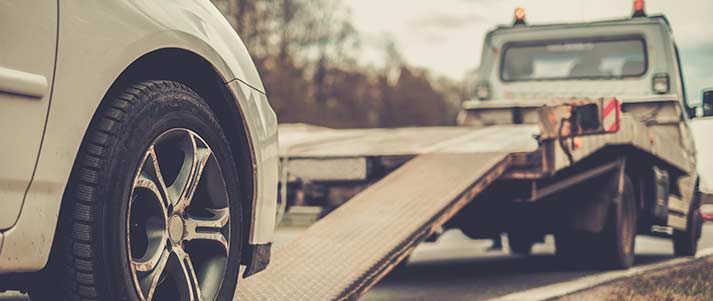Cheap breakdown cover for students
With road tax, car insurance and fuel to pay for, it can be tempting to skip breakdown cover. But that could leave you paying £100s when you need it, so here's how to get cover for less.

Credit: Voyagerix (left), New Africa (right) - Shutterstock
If you've ever broken down without the right cover, you'll know just how much of a nightmarish situation it can be. And with breakdown policies coming in at just a few quid a month (if you know where to look!), getting cover is an absolute no-brainer.
This guide to breakdown car cover for students reveals everything you need to know about choosing the right kind of policy, as well as some great tips for saving money on it.
What's in this guide?
Best breakdown cover companies
These are the best breakdown cover policies with students in mind:
-
RAC
- Vehicle cover – starts at £5.49/month
- Personal cover – starts at £6.68/month.
Along with the AA, the RAC is one of the two big breakdown cover providers in the UK.
RAC claims that they fix four out of five cars on the roadside within 30 minutes. And with 125 years' experience, they are the UK's most experienced breakdown cover company.
What's more, you'll have access to a free legal helpline for expert advice, available 24/7.
-
AA
- Vehicle cover – starts at £7/month
- Personal cover – varies.
The AA offers basic roadside cover from £7/month, with packages going up to £15+ for more comprehensive services.
If you take out breakdown cover with AA, you'll also get access to Smart Benefits. These give you discounts on a range of restaurants, days out and more.
It's also worth noting that The AA have more mobile mechanics on the road than anyone else so, in theory, they should find it pretty easy to get to you quickly.
-
Green Flag
- Vehicle cover – varies
- Personal cover – varies.
Green Flag are a little different to the AA and RAC. Rather than having their own fleet of branded vans, they subcontract work out to local vehicles and mechanics.
However, they're still a great option and well respected nationally.
Green Flag promises to give you up to 50% off your renewal quote from AA or RAC if you switch to them (and your car is less than 10 years old).
Also note that, according to them, you can get up to 40% off the prices they give on the phone by buying online.
-
MoneySuperMarket
You can also try to find cheap breakdown insurance on MoneySuperMarket. Being one of the best comparison sites, they compare 14 breakdown cover companies to find the best price for you.
Simply fill out your details and MoneySuperMarket will show you the best available deals. It's always worth checking if there are cheaper options elsewhere before signing up with any of the companies mentioned above.
If you decide to go with a lesser-known provider, thoroughly research things like average response time and customer satisfaction (Trustpilot is a good place to start) before signing up. Sometimes spending a couple of extra quid is worth it!
Do you need breakdown cover?
Legally speaking, no, you don't need breakdown cover. Unlike car insurance or a driving licence, it's not absolutely necessary to have breakdown cover before you hit the road.
However, just like a good student bank account or a part-time job, not being a legal requirement doesn't mean that breakdown cover isn't worth having.
Although your regular car insurance will cover you if you're in an accident on the road, it won't have your back if your car suddenly decides to pack in when you need it most – like when you're halfway along the motorway with no service station or signs of civilisation anywhere.
In short, although you can officially get away with driving without breakdown cover, we really wouldn't recommend it!
What does breakdown cover include?

Credit: Nejron Photo - Shutterstock
There are a few different levels of breakdown car cover that will cover you for different situations.
As for which one to go for, it's just a matter of assessing your situation and deciding which would be most useful in your time of need (although obviously, you can't predict these things!).
Types of breakdown cover
Here are the different types of breakdown cover you need to know about:
-
Roadside assistance
Also known as 'local cover', this is arguably the most basic form of breakdown cover. Roadside assistance will ensure your provider sends out a mechanic and a recovery vehicle if you break down on the road.
If they can't fix your car there and then, they'll usually tow it to a nearby garage to complete the job.
However, roadside assistance won't usually cover you if you break down at (or very close to) your home. In that case, you'll be needing...
-
Home start
Sometimes known as 'at home cover', this has your back if you break down (you guessed it) at home. Usually, this is when your car won't start, perhaps because you haven't driven it in a while and the battery has gone flat.
Occasionally, this will also cover breakdowns within a short distance of your home, but not always.
-
National recovery
Unlike roadside assistance, where they'll just tow your car to the nearest garage, national recovery gives you the option of getting your car towed to any location in the UK.
This is ideal if you often drive long distances, like from your family home to university. Rather than getting dumped at a garage halfway between the two, you and your car can be taken to wherever you were trying to get to.
-
Onward travel
This more comprehensive service is best suited to those who do a lot of travelling or are heavily reliant on their car for getting to work.
With onward travel insurance, you'll be provided with some kind of solution for getting by without your car. That could mean a courtesy car for you to hire, alternative public transport arrangements or even overnight accommodation while you wait for your car to be fixed.
Should you get personal or vehicle breakdown cover?
Beyond the level of breakdown cover, you can also choose whether you'd like to cover a specific vehicle (most likely your own, if you have one), or take out personal breakdown insurance, which covers you no matter what vehicle you're in.
Personal breakdown insurance could be something to consider if you spend a lot of time travelling in various cars – be that as a passenger or as a driver. That's right, it will cover you even if you're just a passenger. This can be useful if you're always getting a lift to work or uni.
Of course, these kinds of privileges come at a price, and personal breakdown insurance tends to be more expensive than your standard vehicle-specific cover.
What isn't included in breakdown cover?
Some companies have exclusions on their policies, such as breakdowns due to human error. This could include running out of fuel or leaving the lights on all night and waking up to a flat car battery. Others might have a limit on the number of call-outs you can have in a year.
Moral of the story? Always read the small print!
Getting the cheapest breakdown cover

Credit: Pixel-Shot - Shutterstock
If you're looking to save some money, make sure to use our tips for finding the cheapest breakdown cover:
-
Pay upfront rather than monthly
Although paying monthly can be convenient if you don't have the cash to pay it all upfront, it's worth noting that paying in instalments is likely to work out more expensive overall.
Always check the cost of an annual plan compared to monthly to see if you can save money.
-
Never choose automatic renewal
When your policy is up for renewal, never feel pressured to stay loyal – and never opt for automatic renewal.
Rates will have probably changed since the last time you researched them, so there's a good chance that your policy is no longer competitively priced.
If you reckon you can get a better deal elsewhere, don't be afraid to check!
Remember that companies like Green Flag will offer you up to 50% off whatever you're quoted to renew from the AA or RAC if you're car is under 10 years old. So, even if one of these companies offers a good deal, you might be able to get it even cheaper.
-
Don't be afraid to haggle
When you call up to renew or cancel your policy, don't forget to haggle for a good deal. If you've not had to use your cover all year, now's the time to mention it – they want their customers to need them as little as possible, so they'll want to keep people who never need a call-out.
Breakdown insurance companies are known to be among the most lenient when it comes to haggling, so now's your chance to strut your stuff.
-
Use cashback sites
Using cashback sites when you take out your policy could substantially reduce the price of your breakdown cover.
Check if there are any cashback offers available on sites like Quidco and TopCashback. These are the most popular cashback sites, and most of the big breakdown cover providers will be on them.
Both the RAC and the AA currently offer really decent cashback on breakdown policies, so it's worth taking advantage of this.
And for tips on how to get the very best deals on Quidco and TopCashback, check out our guide on how to use cashback sites.
-
Check if you already have breakdown cover
If you've recently bought a brand new car (lucky you), there's a chance you might already be covered for the first year, as many manufacturers offer this as part of the package.
Some insurance companies also include a free breakdown service in their regular car insurance policies, so check that you aren't paying for something you already have.
Some bank accounts (although usually not student ones, unfortunately) will cover you too, so once again it's worth checking if your bank offers this service as part of your account package.
-
Only take the level of cover that you need
Don't be fooled into thinking you need the most expensive policy available.
For example, if you're lucky enough to have a fairly new car, the likelihood of needing comprehensive cover is pretty slim.
Similarly, if you only use your car to drive 20 minutes to and from work, there's not much point in forking out for national recovery.
Read the small print and only pay for what you need. It's also worth keeping your car in good nick, as this should hopefully reduce the chance of a breakdown.
-
Try joint or family cover
Nearly all breakdown insurance providers will have a family cover option or allow you to take out a joint policy with someone you live with.
Although these joint policies will obviously be more expensive as a one-off cost, the cost per person will work out cheaper.
It's even possible in some cases to get joint personal coverage, meaning you'll both be covered in any situation as driver or passenger.
You don't have to drive the same car to be covered, but you can still be on the same policy.
Investing in some breakdown car cover will take away some of the worries of having your own vehicle, and could save you a fortune in the long term.
Without the fear of your car breaking down, you can drive around safe in the knowledge that if the worst does happen, it'll all be taken care of with the minimum amount of fuss. All that for less than the cost of a few pints every month... it's a no-brainer!
Check out our favourite money-saving resources to help you save money without even trying.












